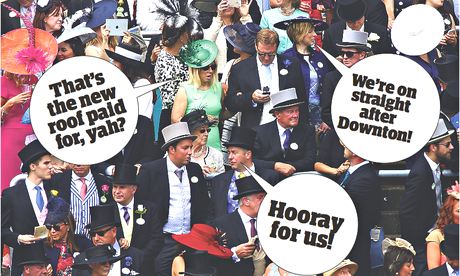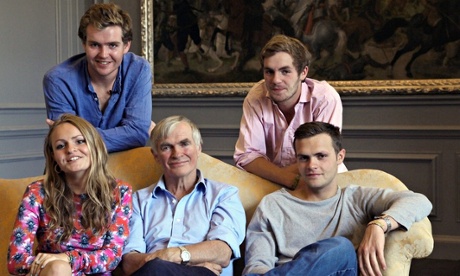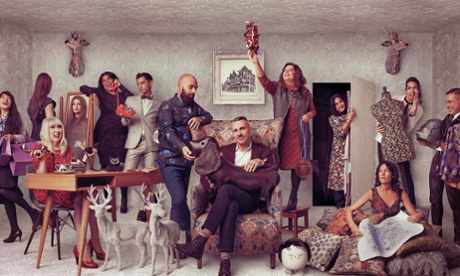 |
| What they're really all talking about at Royal Ascot. Photograph: Rex/Guardian montage |
While if you’re Old Country, you’ll have this black labrador over here, who’s “probably about 500 years old and farts and is enormous and fat, but you love it more than your children”. New Country red wellies, Old Country red cords; Old Town cocaine, Old Country sloe gin etc. Old Town and Old Country are also referred to as “real deal” by the features editor, whose name, incidentally, is Sophia Money-Coutts. No really, not a PG Wodehouse character, an actual person in the real world. And the real deal, I suspect. Well, yes, her father seems to be the 9th Baron Latymer.
This is a scene in Posh People: Inside Tatler, a new documentary series on BBC2 that I am finding both educational and oddly fascinating. Not just the Town v Country matrix, but Tatler goes to Poundland (a little ironically, it must be said); and the ladies who ride their horses sideways (without irony, I think), bouncing along ridiculously and precariously; and the Scottish lord who has graffitied his castle in order to get people to notice it, and him; and the features meeting of Tatler editor Kate Reardon and her staff, who aren’t so very different from the people they put in their magazine. Not the New Town camp – billionaire Russians and Nigerians – but old-school toffs, the real deal. Well, look at Sophia M-C, deals don’t come much realer than her.
Why should I care, though? These absurd and absurdly well-groomed people have very little to do with my life. I don’t ride – sideways, forwards, backwards, any way. I own no red cords, red wellies, nor labradors of any colour (yellow is Old Town, brown New Country). I don’t drink sloe gin. I don’t fit into any of these Tatler camps. I am media too, yes, but my own features editor is called Malik Skint-Lloyds … well, Malik anyway. Why am I even watching?
Francis Fulford, aristocrat and something of a television star himself, thinks it’s about brightening up my own grey middle-class world. “I rather think that perhaps people hanker for a bit of colour, for something a bit different,” he says down a crackly line from Great Fulford, his crumbly Tudor pile in Devon. Very much Old Country, I would say, and less well-groomed – pretty much ungroomed, for centuries. He doesn’t read Tatler, though he admits his wife Kishanda might get it if she were going on a train journey.
Francis can currently be seen on Life is Toff, a BBC3 documentary series about an ancient aristocratic family a little down on its luck (though still asset rich, he admits) trying – not always succeeding – to adapt to the modern world. They were previously to be seen on Channel 4 on The F***ing Fulfords. And that’s not the end of it. You can now watch posh people (Old Town and New Town) shopping on a show called Liberty of London, and selling things on Posh Pawn, both on Channel 4. You can watch them watching TV on the same channel’s Gogglebox – the show’s stand-out couple, Steph and Dom, will soon be grilling Nigel Farage on their own spin-off show.
You can watch other posh people obsessing about themselves in Made in Chelsea (E4). And let’s not forget the biggest show of them all on ITV, Downton Abbey. It seems we have – television especially has – gone bananas for posh.
 |
But they had power, too. “Yes, now we’ve got no power,” he says, sounding only slightly sorry about it. His own attempts to get into local politics failed – he’s now a member of Ukip. And toffs do still have the power to entertain. Perhaps that’s now the point of them. He says that, among what he calls the urban elite, if anyone says something, or is overheard saying something, that is remotely politically incorrect, they lose their job. “I’m allowed to be politically incorrect; it’s important there are people who are allowed to be politically incorrect.”
Ken Loach, old lefty (not a Tatler camp, I suspect), film director and maker of brilliant, thoughtful 1960s television about the very un-posh, including Cathy Come Home, thinks it is nonsense to say that posh people have no power any more. “When you’ve got the Bullingdon boys running the country, how can they not be in power?” he asks. “It’s the old aristocracy, and of course that’s why Ukip is so dangerous, because it represents the interests of what we on the left traditionally call the ruling class, but presenting itself as the voice of working-class people.”
 |
Yes he saw some of Channel 4’s Benefits Street, and though there might have been the odd thing that contradicted that stereotype, the general impression was that “here are feckless people who have no intention of working. And it goes back to the deserving and undeserving poor, the sturdy beggar, back in the Elizabethan age.” Everything seems to go back to around about then.
Are the aristos not stereotyped too? Caricatured, certainly, says Fulford. Television “doesn’t lie, but if you have a long nose, it makes you have a very long nose”. His nose has been lengthened, and his mouth fouled, but he doesn’t think it has been cruel or nasty to him.
Loach believes it’s more serious. “The stereotype of the posh people is that they’re in power and always will be, and the stereotype of the working class is that they have no power. They are a series of caricatures, often with a heart of gold, but nevertheless impotent.”
And, symptomatic of television ignoring real issues for working-class people, there are “so many programmes about hospitals, doctors etc, yet are there ever storylines about cutbacks, private providers, PFI – all the things that NHS staff talk about? Do the soaps deal with evictions, as in the New Era estate in east London? The working class is there but only seen as passive. The posh are often Wodehousian eccentrics but, like the poor, always with us, an inevitable part of the landscape, the natural order. The question of whether this is the best way to order society may be sometimes in the programme makers’ minds, but it is so neutered it rarely registers.”
After speaking to Loach I remember Tom, the revolutionary Irish driver in Downton. Too late. But then Tom went over to the other side, upstairs. Bloody class traitor. Anyway, this is not about the workers, it’s about the toffs.
Jay Hunt, Aussie riff-raff, also chief creative officer at Channel 4 (and previously at the BBC), denies – via email – that her channel is toff potty. “Documentary viewers are drawn to worlds they haven’t seen before. The rarified lives of the very rich is one such world but with shows such as Skint we also give a voice to communities that hardly ever get heard from the other end of the social spectrum.” Skint, which focuses on an estate (different sort, Francis) in Grimsby, goes out at the same time as Inside Tatler. It would be interesting to hear what Loach makes of it, though I doubt he’ll be watching.
Hunt says that during the downturn C4 saw audiences drawn to shows such as Amazing Spaces and Kevin’s Man Made Home that reminded them of the upsides of a pared-down lifestyle. “As the economy feels more buoyant, we are seeing viewers drawn to more aspirational programming.
Seeing someone pawn a submarine or book a butler for a dinner with royalty offers an entertaining glimpse into a life most of us will never have.”
Grayson Perry, urban bohemian, also artist, maker of pots and television, did an excellent three-part series on Hunt’s channel about taste and class – working, middle and upper. Posh people “are like one of those preserved tribes, where we fence off a bit of rain forest, so that they can do their hunting”, he says from his studio. Ah, so all this posh telly is no different from that BBC show Tribe, with Bruce Parry. Also like a David Attenborough documentary. “When I did my programme, I was very aware that they were an endangered species, because none of them can afford the great big rambling mansions they own. They’re a kind of an archaic anachronism in many ways.” F***ing Fulfords, f***ing polar bears, they’re all the f***ing same.
Grayson subdivides the species. “There’s different versions of posh. There’s that eccentric dishevelled, tweedy, country set [Old Country, the Fulfords], and there’s more to do with the City, law, things like that.” Government, too. “I suspect the real wealth of a lot of posh people is self-confidence and connections. That combination, plus a bit of inherited cash, can go a long way to having a disproportionate effect on national life, can’t it? They’re still hugely over-represented statistically, aren’t they, in positions of power.” As well as – and possibly more seriously than – being over-represented on television.
But Grayson is also amused by and generous towards them individually, and says he has met some lovely, well-meaning, polite posh people. And that making his toff show was “huge fun, because in a way they allow themselves to write themselves large on the canvas of their estates. I suppose there’s a sort of obligation, people live up to their cliches in all parts of society.”
He says all three of his class programmes were interesting to make, for different reasons. The working-class people were “unashamedly hedonistic and fun and up for it”. With the toffs, “there was something incredibly straightforward about it: they knew the rules, how things should be and they kept them the same”. Middle-class people are much more self-conscious, looking both ways, worrying about their position in society. “It was sort of raised eyebrows, every conversation has sort of inverted commas floating over it.”
That greyness again, that Fulford was talking about. But perhaps, then, the colour isn’t just above, it’s below too. The interest, for television, lies at the extremities of society, worlds that are unfamiliar to the grey masses watching in the middle. But representing – and misrepresenting – working-class people is obviously more problematic and potentially patronising. Just look at all that stick that Benefits Street came in for. Posh people, on the other hand are, to use a phrase they would understand, fair game. [Points – cameras, shotguns, everything – at Great Fulford, Chelsea, the offices of Tatler … fires.]










0 comments:
Post a Comment